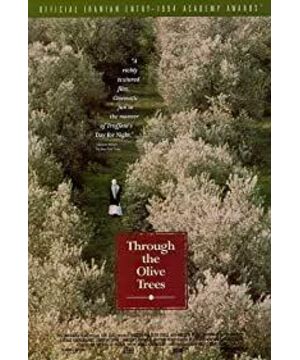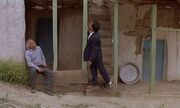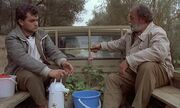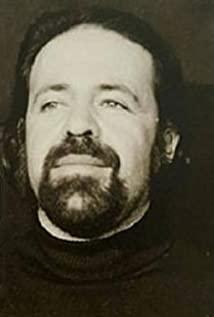Among the six or seven works by Abbas that we had the opportunity to see, I have always felt that this "Lover under the Olive Tree" has something different. Until last night I watched it again, and I suddenly found the answer-the film introduced a lot of green in the color of the screen-the director actually tried to give the audience some beautiful and poetic green! It is these fresh colors that unknowingly affect our mood of watching movies.
Finally, some warm hope loomed in the ruined walls.
2)
Although I have seen a lot of love stories, "The Lover under the Olive Tree" still finds a very easy way to escape the similarities with other love cases: Abbas's lens is completely focused on this. The "partner" of a love relationship-the boy named Hossein, unilaterally tried his best to explain how he repeatedly fought and tried to confess his love to his favorite marriage partner Tahereh. Tahereh never had a direct and positive communication with Hossein from beginning to end. On the one hand, the more speechless she is, the more it draws our interest in whether Hossein can succeed in getting her heart. On the other hand, although we can only see a completely speechless heroine, we can't hear her at all. The attitude of this love story, but this does not stop us from seeing the great happiness that a girl enjoys in this love story.
"I will tell the landlord to let him give us a house. It doesn't cost too much money. In the room you live in, open the window every morning and you can see the mountains face to face. Then you can be very happy... …"
3) It
is certainly an ability to make the film vigorously so that the audience will look up, but it is always close to the ordinary people’s expression of their ordinary sincere emotions and wishes, and insights into the "big" of human nature/life, It is in this respect that Abbas has won the double respect of the industry and the audience. His sight and his compassion have never left the suffering beings in his country for a minute.
Although man-made disasters (such as wars) and natural disasters (such as earthquakes) have caused great damage to people’s livelihoods, these are the themes that film directors in countries like Iran have to face, but Abbas’s works It seems that he is always avoiding direct contact with the disaster event itself, and his interest lies more in the exploration of the impact of disasters. The vitality of human persistence is often best demonstrated in the post-disaster reconstruction process. Every story of Abbas has its true life prototype, even he likes to quote the prototype himself directly in front of the camera, so a lot of lines we hear are actually the character's own narration or summary of his real life. From this perspective, what we seem to see is a "very casual" and "very casual" Abbas; but if you change from another angle-you are looking at Abbas's work from the perspective of artistic processing, We will see a director who is very rigorous and enjoys carefully crafting his work.
In "Lover under the Olive Tree", Abbas deliberately implanted love into the filming process of a movie, and the filming location of the story was carefully selected in a deserted two-story residential house. As a result, the separation between the upstairs and the downstairs also cleverly constitutes the separation between "in and out of play": "Upstairs" is when the filming is not in play, Hossein worked hard to persuade Tahereh to express her wishes for this marriage. "Downstairs" is used to show the process of filming work.
Then there is the climax part (and the ending part) of the whole film-Hossein chasing up the part where Tahereh wants to confess again.
In the beginning, the part where two people walked one after another in the woods, the camera continued to use the butt of Hossein and Tahereh single-player images to express that they were still in the two incompatible worlds; then it was the most fascinating. The release that people expect and is the most unexpected-what we are looking forward to is a long shot of a VLS (referring to the "super scene" defined from the "scene")-Hossein rushed down the hillside and ran across In the long and narrow olive grove, from a distance, he finally caught up with Tahereh on the big lawn under the mountain. At this moment, how we want to see the expressions of the two people and hear their dialogue clearly, but Abbas insisted Let the camera stop there, and refused to give us a zoom in! At that moment, in fact, we had no time to complain about the director’s "stinginess", but we had to hold our breath and stare at the two "white dots" that are far away in the front and back of the screen: the latter slowly catches up. One, and quickly surpassed the past; and then, two "white dots" moved hard from left to right (presumably there should be a very positive dispute between the two)... Then, two white dots The movement of the dots seemed to pause for a few seconds; after that, one of the white dots continued to move forward and eventually disappeared in the depths of the screen, while the other white dot turned around and turned back and ran all the way towards the position where those who watched us were standing. Here, from the posture, he seems to run very happily?
This is really a wonderful ending! ——The director used a completely open process and did not give us a clear answer, but in the relaxed and jumping notes continuously sent by the baroque background music, all the poetic elements accelerated the generation of a kind in our hearts Unexplainable joy.
I really can’t help but admire the greatness of Abbas! !
Use fiction to calmly express the huge realistic impact that non-fiction can have, while at the same time relying on fiction's control over expression to refine and smooth its reflection on life-this exquisite realism , Is exactly where Abbas's achievement lies.
OVER
View more about Through the Olive Trees reviews








